The ехpression of digital marginalization in entering the hybrid space of modern society (using the example of novice users)
Today, when people find themselves crossing virtual and real social spaces, it is important to understand the phenomenon of digital marginalization in order to minimize negative consequences. Understanding the nature of digital marginalisation is important because of the increasing risks and costs of digital transformation errors, especially given the social consequences of human exclusion. The main objective of this study is to identify the level of digital marginalization in the integration into the hybrid environment of modern society. The initial hypothesis of the research suggests that the degree of expression of marginalization trends correlates with the level of development of digital and information-communication technologies necessary for full life in hybrid space. To verify this hypothesis, a sociological survey was conducted in the fall of 2024 with a sample of 460 respondents who were asked to assess their user level. The analysis of the data obtained shows that it is the novice users who are experiencing a lack of orientation in the political-economic, socio-cultural and technological aspects of the digital society. This group of interviewees is characterized by negative subjective experiences, arising from the interaction with digital technologies, services and platforms, as well as the need to immerse themselves in digital reality. Their most pronounced feeling was fear of losing personal data, and in the perception of the hybrid reality of digital society, fear of the future, both for themselves and their loved ones. Survey results show that approximately half of the novice users do not feel the need to learn digital devices, technologies and services. This lack of need reduces the motivation to learn new digital tools. Thus, it can be stated that the digital marginalization of the entry into hybrid space is due to the level of the population’s mastery of new technologies.
Figures
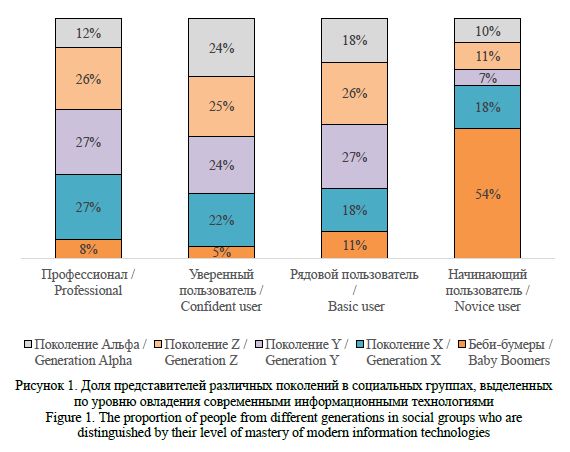
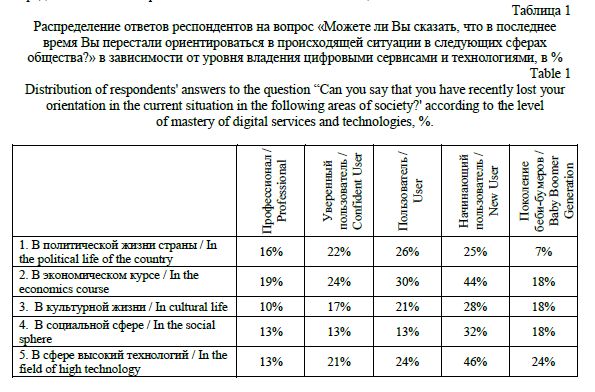
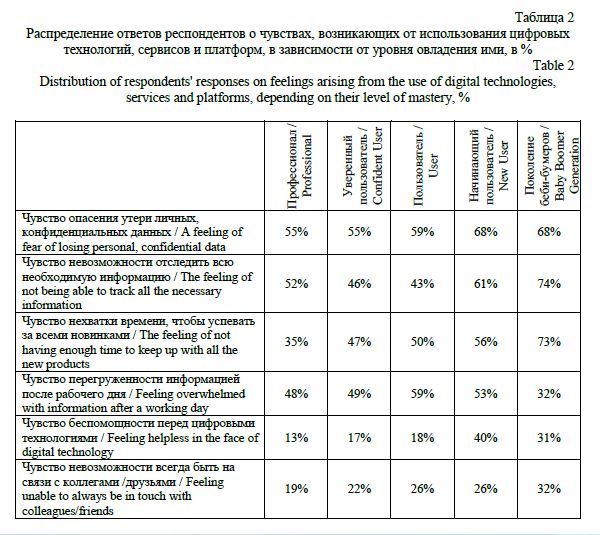
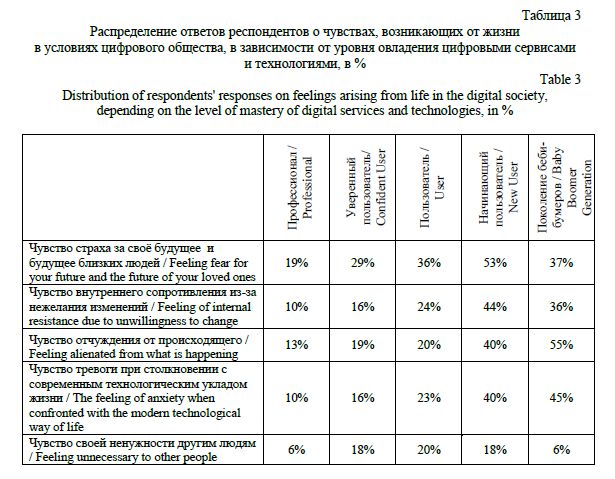
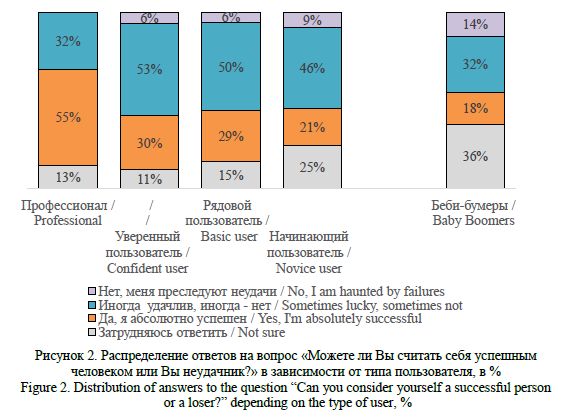


Zotov, V. V., Gavrilchenko, K. E., Gubanov, A. V. (2025), “The ехpression of digital marginalization in entering the hybrid space of modern society (using the example of novice users)”, Research Result. Sociology and Management, 11 (1), 110-127, DOI: 10.18413/2408-9338-2025-11-1-0-7.
Research result. Sociology and Management is included in the scientific database of the RINTs (license agreement No. 765-12/2014 dated 08.12.2014).
Журнал включен в перечень рецензируемых научных изданий, рекомендуемых ВАК


















While nobody left any comments to this publication.
You can be first.
Vartanova, E. L. (2018), “Conceptualization of digital divide: major stages”, Medi@l'manah, (5), 8-12, DOI: 10.30547/mediaalmanah.5.2018.812. (In Russian)
Vartanova, E. L., Gladkova, A. A. (2021), “Digital divide, digital capital, digital inclusion: dynamics of theoretical approaches and political decisions”, Vestnik Moskovskogo universiteta. Serija 10: Zhurnalistika, (1), 3-29, DOI: 10.30547/vestnik.journ.1.2021.329. (In Russian)
Volchenko, O. V. (2016), “Dynamics of digital inequality in Russia”, Monitoring obshhestvennogo mnenija: Ekonomicheskie i sotsialnye peremeny, (5), 163-182, DOI: 10.14515/monitoring.2016.5.10. (In Russian)
Voronina, N. S. (2021), “Digital inequality of internet users in Russia and Europe: gender aspect”, Informatsionno-analiticheskiy byulleten Instituta sotsiologii FNISC RAN, (4), 28-51, DOI: 10.19181/INAB.2021.4.3. (In Russian)
Dobrinskaya, D. E., Martynenko, T. S. (2019), “Perspectives of the Russian information society: digital divide levels”, Vestnik Rossiyskogo universiteta druzhby narodov. Seriya: Sotsiologiya, 19 (1), 108-120, DOI: 10.22363/2313-2272-2019-19-1-108-120. (In Russian)
Zotov, V. V., Aseeva, I. A., Budanov, V. G., Belkina, V. A. (2022), “Converting the sociotechnical convergence hazards into the risks of digitalization”, Tsifrovaya sotsiologiya, 5 (2), 4-20, DOI 10.26425/2658-347X-2022-5-2-4-20. (In Russian)
Kostina, N. B., Chizhov, A. A. (2021), “The role of classic and modern concepts for the analysis of the digital divide factors”, Vestnik Permskogo un-ta. Filosofiya. Psikhologiya. Sotsiologiya, (2), 260-269, DOI: 10.17072/2078-7898/2021-2-260-269. (In Russian)
Kostrikova, N. A., Maitakov, F. G., Yafasov, A. Ya. (2019), “The Risks of Society Marginalization in Transition to a Digital Economy”, Razvitie teorii i praktiki upravleniya sotsialnymi i ekonomicheskimi sistemami: Materialy Vosmoy mezhdunar. nauchno-prakt. konf. [Development of theory and practice of management of social and economic systems: Materials of the eighth international scientific and practical conference], Kamchatka State Technical University, Petropavlovsk-Kamchatsky, Russia, 190-194. (In Russian)
Martynenko, T. S., Dobrinskaya, D. E. (2021), “Social inequality in the age of algorithms: from digital to algorithmic divide”, Monitoring obshhestvennogo mnenija: ekonomicheskie i sotsialnye peremeny, (1), 171-192, DOI: 10.14515/monitoring.2021.1.1807. (In Russian)
Radaev, V. V. (2019), Millenialy: Kak menyaetsa rossiyskoe obshhestvo [Millennials: How Russian society is changing], Publishing House of the Higher School of Economics, Moscow, Russia, 224. (In Russian)
Shabunova, A. A., Kalachikova, O. N., Leonidova, G. V., Smoleva, E. O. (2016), “Exclusion as a criterion for selecting socially vulnerable population groups”, Ekonomicheskie i sotsialnye peremeny: fakty, tendencii, prognoz, (2), 29-47, DOI: 10.15838/esc.2016.2.44.2. (In Russian)
Acharya, B. (2017), “Conceptual evolution of the digital divide: A systematic review of the literature over a period of five years (2010-2015)”, World of media. Journal of Russian Media and Journalism Studies, (1), 41-74.
Demo, P. (2007), “Marginalização digital: digital divide”, Senac journal of education and work, 33 (2), 5-19.
Du, J. T., Xie, I., Narayan, B., Sayyad Abdi, E., Wu, H. J. Liu, Y-H., Westbrook, L. (2017), “Vulnerable communities in the digital age: advancing rescarch and exploring collaborations”, iConference 2017 Proceeding “Global Collaboration across the information community”, Wuhan, China, 911-914, DOI: 10.9776/17402.
Galpin, C. (2022), “At the digital margins? A theoretical examination of social media engagement using intersectional feminism”, Politics and governance, 10 (1), 161-171, DOI: 10.17645/pag.v10i1.4801.
Geeta, A. (2023), “Marginalization at cyberspace: a new dimension of violence against women and girls”, Cyberfeminism and gender violence in social mediа, IGI Global, Hershey (PA, USA), 100-107, DOI: 10.4018/978-1-6684-8893-5.ch007.
Howe, N., Strauss, W. (2000), Millennials rising: the next great generation, Vintage Books, N. Y., 432.
Imran, A. (2023), “Why addressing digital inequality should be a priority”, The electronic journal of information systems in developing countries, (89), DOI: 10.1002/isd2.12255.
Liotta, L. A. (2023), “Digitalization and social inclusion: bridging the digital divide in underprivileged communities”, Global international journal of innovative research, 1(1), 714, DOI: 10.59613/global.v1i1.2
Lubbers, M. (2022), “Social networks and the resilience of marginalized communities”, A research agenda for social networks and social resilience, Edward Elgar Publishing, Cheltenham, UK, 1-16, DOI: 10.4337/9781803925783.
McCrindle, M. (2009), The ABC of XYZ: understanding the global generations, UNSW Press, Sydney, 237.
Norris, P. (2001), Digital divide: civic engagement, information poverty, and the internet worldwide, Cambridge University Press, Cambridge, UK, 304.
Park, R. E. (1950), “Cultural conflict and the marginal man”, Race and culture, The Free Press, Glencoe, Ill., 372-376.
Ragnedda, M., Muschert, G. W. (2013), The digital divide: the internet and social inequality in international perspective, Routledge, New York, NY, 344.
Reyes, C. (2020), “Negotiating digital marginalization: immigrants, computers, and the adult learning classroom”, Atlantic journal of communication, 30 (1), 1-12, DOI: 10.1080/15456870.2020.1786385.
Robinson, L., Cotten, S. R., Ono, H., Quan-Haase, A., Mesch, G., Chen, W., Schulz, J., Hale, T.M., Stern, M. (2015), “Digital inequalities and why they matter”, Information, communication & society, 18 (5), 569-582, DOI: 10.1080/1369118X.2015.1012532.
Van Dijk, J. (2020), The digital divide, Medford: Polity Press, Cambridge, 208.
Warschauer, M. (2003), Technology and social inclusion: rethinking the digital divide, Cambridge (Mass.); London: MIT press, 260.
The study was funded by a grant from the Russian Science Foundation (Project No. 24-28-00716 ‘Digital Marginalisation in the Conditions of Sociotechnical Convergence’).